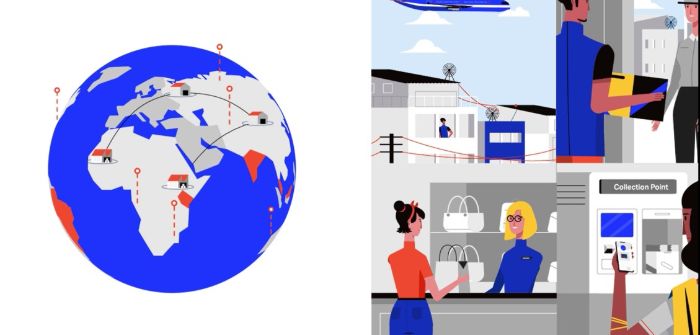Due to the current coronavirus crisis, consumers are avoiding crowds and staying at home. Many have abandoned traditional retail for its online counterpart. The online demand for products related to entertainment, gardening and repairs but also medical equipment and particularly face masks, is on the rise.
After this crisis many will have understood how easy and convenient it can be to order online and receive the products at home. Studies have shown that consumers who purchased online during the holiday season repeated this buying pattern post-holiday. New e-commerce consumers most probably will continue shopping online after the pandemic.
Air freight will play an essential part in supporting global trade driven by e-commerce.
According to ICAO and McKinsey, air cargo transports 80% of cross-border B2C e-commerce shipments. E-commerce consumers demand fast deliveries, and speed is air cargo’s main advantage.
The opportunities e-commerce brings are clear: as it is a global trend, small businesses can now export their goods and reach the world-wide market, diversifying the competition and creating new jobs. For the air cargo industry, this means we need to adapt cargo handlers’ and airlines’ daily operations to deal with growing volumes of cargo and ensure that the new players comply with international rules (particularly on safety and security) and carry their business ethically.
The coronavirus pandemic will also bring a need for improvement. The crisis has the potential to be a critical wake-up call for digitization in the air cargo industry; the general public will expect health and safety provisions; other requirements like sustainability, ethics, safety, and border and customs procedures will change more frequently; and transparency will be key to speeding up processes and avoiding blockades.
Air cargo actions to capture the growth of e-commerce
The International Air Transport Association (IATA) is the trade association for the world’s airlines, representing some 290 airlines or 82% of total air traffic. As e-commerce is the present and future of air cargo, IATA works with the industry to transform and capture the rise of online sales.
Reaching even higher levels of safety and security
More and more parcels will be processed and moved by air cargo every day as e-commerce grows. This raises the odds of having dangerous goods or potential illegal items inserted in the supply chain.
Achieving end-to-end digitization of the supply chain
Speed is air cargo’s number one asset. If the industry wants to stay competitive, processes and documentation need to move into the digital era. We must not only partner with all the actors in the supply chain but also digitally blend together. Through data sharing, not only will the multiple actors of the door-to-door transportation process be able to plan and deliver on their promises, but also develop contingency strategies for any deviation.
Modernizing and automating cargo facilities
Already congested, airports and cargo facilities risk exceeding their capacity with the higher volumes expected. IATA is working with airports, customs and handlers to modernize air cargo terminals and operate them efficiently. This includes implementing the latest technology, automation and handling standards to optimize flows.
Engaging and communicating with e-commerce players
Most online retail companies are new to air cargo. They don’t necessarily know all the requirements to ship by air, and airlines are not always aligned to the level of service they require. Active engagement and communication are critical if the air cargo industry is to get the most out of e-commerce.
Placing the customer at the center of everything we do
Having new industry players joining the air cargo supply chain means adapting to new rules. The industry needs to become more customer-centric by improving their digital user experience and reacting to the needs of new partners. Some customers are now ready to become their own logistics providers if they don’t find what they want. Innovation is critical to adapt to new and ever-changing business models.
IATA is working closely with the industry and has a dedicated webpage www.iata.org/cargo on COVID-19 air cargo actions and relevant documentation. As part of the efforts to ease e-commerce during and after the pandemic, it launched a global engagement plan to have a comprehensive dialog. This will enable the industry to capitalize on e-commerce business.
In addition, you can learn more about how air cargo can better respond to the opportunity of this new era of e-commerce in the Air Cargo and e-Commerce enabling Global Trade whitepaper.


